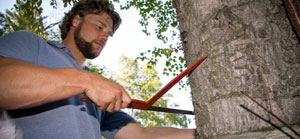Harvesting Operations Supervisor
Tasks & duties

Harvesting operations supervisors may do some or all of the following:
-
help develop business plans and budgets for harvesting
-
set contract prices
-
oversee the contracts between forest owners, harvesting companies and harvesting crews
-
deal with any problems between the contract harvesting crew and the forest owners
-
co-ordinate the harvesting operations in order to meet the targets set out in the business plan
-
ensure the quality of logs harvested
-
ensure that logs are processed in the best way to optimise their value
-
sort out any complaints from log buyers
-
develop and monitor safety strategies and ensure all occupational health and safety requirements are met
-
investigate and report on any accidents
-
ensure good environmental practices
-
investigate and write reports on any environmental problems in areas being harvested
-
plan for roading and other requirements for new harvesting sites
Skills & knowledge

Harvesting operations supervisors need to have:
-
knowledge of forest harvesting techniques
-
the different lengths and grades of logs to ensure quality control
-
knowledge of forest machinery
-
understanding of Occupational Safety and Health (OSH) regulations
-
understanding of geology, soils and the impacts of forestry on the environment
-
good written and oral communication skills
-
management and people skills
-
good organisational ability
-
maths and computer skills
Entry requirements
To become a harvesting operations supervisor, a National Certificate, National Diploma or degree in forestry is preferred. You also need to have a current driver's licence.
Secondary education
Useful subjects for entry into tertiary courses in forestry include maths, computer studies, economics, biology and chemistry.
Training on the job
Skills are gained on the job and courses are available in topics such as occupational safety and health and management.
Useful experience
Forestry harvesting work is useful experience for harvesting operations supervisors.
Related courses
Forestry Studies
Document Actions
